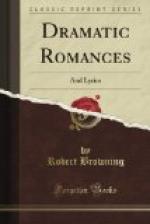Notes: “The Heretic’s Tragedy” is an Interlude imagined in the manner of the Middle Ages, and typically representing this period of human development in its quaint piety and prejudice, its childish delight in cruelty, and its cumulative legend-making during the course of two centuries as reflected through the Flemish nature. It is supposed to be sung by an abbot, a choir-singer, and a chorus, in celebration of the burning of Jacques du Bourg-Molay, last Grand Master of the wealthy and powerful secular order of Knights Templar, which came into rivalry with the Church after the Crusades and was finally suppressed by Philip IV of France and Pope Clement V, Molay’s burning at Paris in 1314 being a final scene in their discomfiture and the Church’s triumph.
8. Plagal-cadence: a closing progression of chords in which the sub-dominant or chord on the fourth degree of the scale precedes the tonic or chord on the first degree of the scale. The name arises from the modes used in early church music called Plagal Modes, which were a transposition of the authentic modes beginning on the fourth degree of the authentic modes.
12. Bought of . . . Aldabrod, etc.: Clement’s arraignment of Jacques or John being that the riches won piously by the order during the Crusades, he had not scrupled to sell again to Saladin, the Sultan, who is portrayed by Scott in “The Talisman.’’
14. Pope Clement: the fifth Clement (1305-1314).
18. Clavicithern: a cithern with keys like a harpsichord.
25. Sing “Laudes”: Sing the seven Psalms of praise making up the service of the Church called Lauds.
48. Salv
60. Sharon’s rose: Solomon’s Song 2.1.
HOLY-CROSS DAY
On which the jews were forced
to attend
an annual Christian sermon in
Rome
[” Now was come about Holy-Cross Day, and now must my lord preach his first sermon to the Jews: as it was of old cared for in the merciful bowels of the Church, that, so to speak, a crumb at least from her conspicuous table here in Rome should be, though but once yearly, cast to the famishing dogs, under-trampled and bespitten-upon beneath the feet of the guests. And a moving sight in truth, this, of so many of the besotted blind restif and ready-to-perish Hebrews! now maternally brought-nay (for He saith, ‘Compel them to come in’) haled, as it were, by the head and hair, and against their obstinate hearts, to partake of the heavenly grace. What awakening, what striving with tears, what working of a yeasty conscience! Nor was my lord wanting to himself on so apt an occasion; witness the abundance of conversions which did incontinently reward him: though not to my lord be altogether the glory."-Diary by the Bishop’s Secretary, 1600.]




